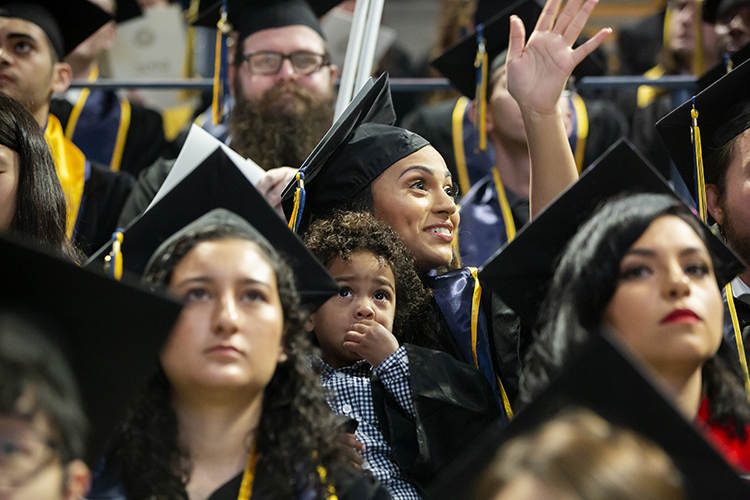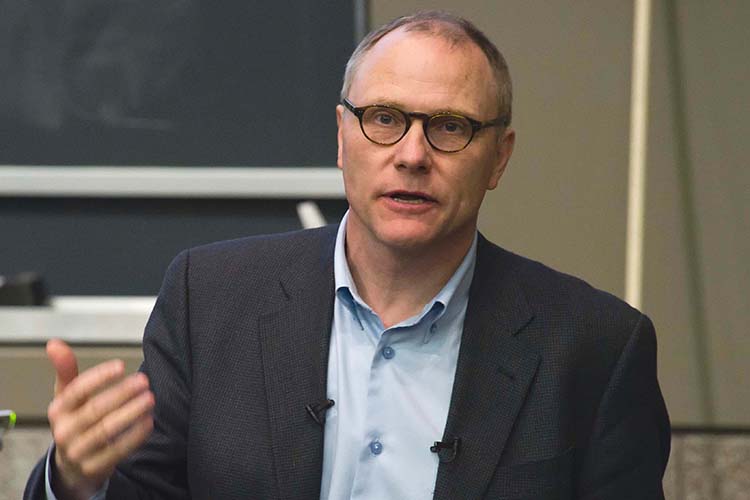David Card: Debunking myths about the value of education
Berkeley economist David Card will discuss the importance of investing in public education during the 107th annual Martin Meyerson Berkeley Faculty Research Lecture

February 25, 2020

David Card, the Class of 1950 Professor of Economics, has been selected to give the 2020 Martin Meyerson Berkeley Faculty Research Lecture on Monday, March 2.
In an era of financial insecurity and cultural tension, a dystopian vision of university education has gained traction in the United States: The cost of public higher education is too high, critics say, and when student debt and job insecurity are factored in, the benefits are too few.
But for UC Berkeley economist David Card, that critique ignores a mass of positive data. While profound challenges confront American higher education, he says, universities still bring enormous economic benefits to individual students and to the nation.
Card, the Class of 1950 Professor of Economics, has been selected to give the 2020 Martin Meyerson Berkeley Faculty Research Lecture on Monday, March 2. In a talk titled “Are We Under-investing in Education?,” he will explore how investing in education can bring broad benefits.
Among economists and other experts, it is well accepted that “the economic rewards for a college degree are higher than ever,” Card said in a recent interview. “When you consider the economic incentives, plus all the other benefits of higher education — better health, a longer life, potentially more life satisfaction — it’s clearly not the case that incentives for people to acquire high education have dropped off.”
The Meyerson Lectures are a 107-year-old tradition celebrating excellence in research at Berkeley. Card’s lecture will take place from 4 to 5 p.m. in the Chevron Auditorium at International House, 2299 Piedmont Ave. in Berkeley. The lecture is free and open to the public.
Card is widely seen as one of the most influential economists of his generation, focused on issues that shape day-to-day life in American communities: wages, education, immigration and gender and race disparities in the labor market. He directs Berkeley’s Center for Labor Economics and recently was elected the 2021 president of the American Economic Association.
Engines of growth — and mistrust
In the United States, universities have long been seen as engines of economic growth, essential for supporting upward mobility — both for individuals and the nation.
But across many decades, a persistent counter-narrative has cast doubt on their value. In the anti-communist fervor of the 1950s, universities were sometimes described as dens of subversion. In the 1960s, amid conflict over civil rights and the Vietnam War, they were seen as centers of dangerous radicalism. Republican Ronald Reagan was elected governor of California in 1966 after a campaign that targeted political turbulence on the Berkeley campus.
More recently, the Great Recession and deep cultural conflicts became woven together with concerns about rising tuition and growing student debt to drive an updated version of university mistrust.
In an interview, Card acknowledged that many universities — and their students — are stressed by rising demands for service, increased expectations and declining budgets. He traced the current dynamics to the 1950s and 1960s: A demographic wave of Baby Boomers was enrolling, including an historic surge of women. But investment in public universities flattened out.
“If you look around the Berkeley campus,” he said, “you’ll see lots of buildings built in 1965, ’68, ‘69. And then everything kind of came to an end. … And we really have never gotten back on track. So, our public education system has expanded very little, especially in higher education.”
Meanwhile, enrollment growth in the UC system has not kept up with California population growth. The result: Enrollment as a proportion of the total state population is much lower today than in 1950, Card said.
Similar trends have weakened higher education nationwide. Where the United States was once the global leader in providing public university-level education to its students, the nation today is not even in the Top 10 among member nations of the Organization for Economic Cooperation and Development (OECD).
Berkeley, a leader in education economics
Card said a community of economists and other researchers at Berkeley has been an influential force in exploring the impacts of investment in education at all levels.
For example, he said, before the 1970s, low-income public elementary and high school districts tended to have relatively low per-pupil spending — that was all they could afford. Affluent districts could afford higher spending. But laws changed to require more equal funding for districts, administered at the state level, with extra funding often provided for those that need extra support.
Card cited work by other Berkeley colleagues showing that “that equalization really has benefited low-income people, children of lower-income families, that were in these areas that were underfunded” — many of them students of color.
He also cited a study at one mid-level Florida university that focused on students who barely managed to win admission and those who fell just short of admission. Many of the students were Latinx, and those who were not admitted often went to community colleges.
Students who graduated from the four-year university “ultimately received higher earnings and progressed to better quality jobs,” Card said. “That’s the kind of evidence that people have been putting together on these questions.”
A second Meyerson Lecture will be given by Steven Lindow, a world leader in environmental and ecological sciences, on Friday, April 3, at 4 p.m. in the Chevron Auditorium at International House. Lindow’s innovative research has helped to reveal the complex webs of life that link microbes, plants and the environment.